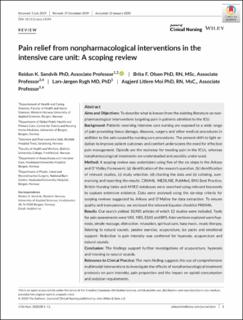Pain relief from nonpharmacological interventions in the intensive care unit: A scoping review
Peer reviewed, Journal article
Published version
Permanent lenke
https://hdl.handle.net/11250/2651975Utgivelsesdato
2020Metadata
Vis full innførselSamlinger
- Import fra CRIStin [3580]
- Institutt for helse- og omsorgsvitskap [2721]
Originalversjon
Sandvik, R. K., Olsen, B. F., Rygh, L. J. & Moi, A. L. (2020). Pain relief from nonpharmacological interventions in the intensive care unit: A scoping review. Journal of Clinical Nursing, 29(9-10), 1488-1498. 10.1111/jocn.15194Sammendrag
Aims and Objectives
To describe what is known from the existing literature on nonpharmacological interventions targeting pain in patients admitted to the ICU.
Background
Patients receiving intensive care nursing are exposed to a wide range of pain provoking tissue damage, diseases, surgery and other medical procedures in addition to the pain caused by nursing care procedures. The present shift to light sedation to improve patient outcomes and comfort underscores the need for effective pain management. Opioids are the mainstay for treating pain in the ICUs, whereas nonpharmacological treatments are understudied and possibly under‐used.
Method
A scoping review was undertaken using five of the six steps in the Arksey and O´Malley framework: (a) identification of the research question, (b) identification of relevant studies, (c) study selection, (d) charting the data and (e) collating, summarising and reporting the results. CINAHL, MEDLINE, PubMed, BMJ Best Practice, British Nursing Index and AMED databases were searched using relevant keywords to capture extensive evidence. Data were analysed using the six‐step criteria for scoping reviews suggested by Arksey and O´Malley for data extraction. To ensure quality and transparency, we enclosed the relevant Equator checklist PRISMA.
Results
Our search yielded 10,985 articles of which 12 studies were included. Tools for pain assessments were VAS, NRS, ESAS and BPS. Interventions explored were hypnosis, simple massage, distraction, relaxation, spiritual care, harp music, music therapy, listening to natural sounds, passive exercise, acupuncture, ice packs and emotional support. Reduction in pain intensity was conferred for hypnosis, acupuncture and natural sounds.
Conclusion
The findings support further investigations of acupuncture, hypnosis and listening to natural sounds.
Relevance to Clinical Practice
The main finding suggests the use of comprehensive multimodal interventions to investigate the effects of nonpharmacological treatment protocols on pain intensity, pain proportion and the impact on opioid consumption and sedation requirements.

